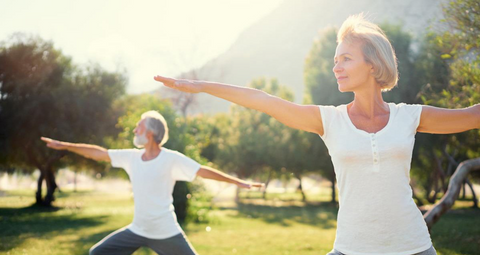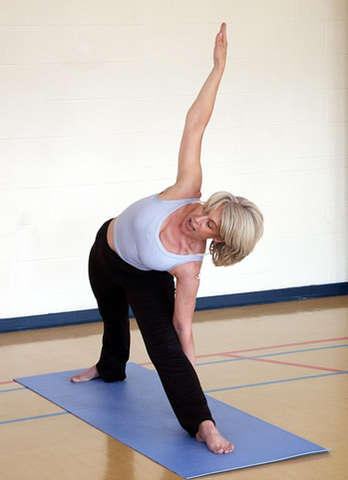- * Gift Cards *
- Yoga
-
Books
- New Releases
- Author Collections
- LifePower Yoga TT
- Card Decks
- Journals / Dream Journals
- Sacred Geometry
- Children's Books
- Meditation Books
- Yoga Books
- Consciousness
- Buddhism
- Vedanta
- Calendars
- Coloring Books
- Dreams
- Health / Wellness
- Hermeticism
- Mindfulness
- Mythology
- Near Death Experience
- Spiritual Wisdom
- Personal Growth
- Spiritual Fiction
- Abundance / LOA
- A Course In Miracles
- Meditation
- Hemi-Sync®
- Wellness
- Blog
- Sign in
-
USD $
- * Gift Cards *
-
Yoga
-
Books
-
Meditation
-
Hemi-Sync®
-
Wellness
- Blog
Yoga Brings Unexpected Health Benefits to Seniors and Caregivers
August 18, 2018

Guest post by Harry Cline
You are never too old to get started in yoga. And while most of us realize being active throughout life is good for us, science is showing yoga to be especially good for both seniors and their caregivers. Physical and mental health benefits await those of all ages when involved with a regular yoga program.
Less pain. One of the wonderful and unexpected health benefits to seniors who participate in yoga is reduced joint pain. It turns out that yoga helps reduce inflammation due to arthritis and other health conditions. Yoga can improve the strength and flexibility of joints through targeted poses.
Reduced risk of gout. Yoga can reduce the amount of uric acid in your body. High levels of uric acid are associated with gout.
Better cardiovascular health. Yoga is known to lower blood pressure and is sometimes recommended in programs for fighting heart disease. Practicing yoga can help with recovery from heart surgery, lowering risk of stress, anxiety, and depression.
Help managing diabetes. Did you know some yoga poses can encourage internal organs to function more efficiently? By targeting muscles that can help the pancreas do its job, some diabetics can better manage their type 2 diabetes symptoms. Being more physically active and lowering stress levels through yoga can also have a positive impact for diabetics.
Improved balance. According to experts cited by Health Journal, balance is one of the first physical abilities that wanes with age. However certain yoga poses can enhance balance, leading to less risk for falls, better focus, and better stability.
Better mindfulness. Meditation is a key component in yoga. Part of yoga is learning to focus on your body, sensations, input, and responses. Through the practice of yoga and mindful meditation, you can feel more empowered, patient, and relaxed, and even improve your sleep patterns.
 Yoga for beginners. If you’re new to yoga, you might be a little intimidated. The idea of turning your body into what looks like contortions strikes fear into some hearts. However, through a gradual and gentle beginning, nearly anyone can engage yoga practices. You can begin with some gentle chair yoga. Top Fitness Tutorials suggests following along with instructional videos initially. Note one of the many benefits of chair yoga is the ability to perform the exercises almost anywhere. You can follow videos via YouTube on a rainy day. It’s great to be able to stay active from the comforts of home, thanks to technology. Another suggestion is employing senior-friendly fitness apps and Wii games into your workout regimen. As The Washington Post explains, as with any other new exercise program, there are certain risks involved with beginning yoga. You should always consult your physician before starting a new fitness program.
Yoga for beginners. If you’re new to yoga, you might be a little intimidated. The idea of turning your body into what looks like contortions strikes fear into some hearts. However, through a gradual and gentle beginning, nearly anyone can engage yoga practices. You can begin with some gentle chair yoga. Top Fitness Tutorials suggests following along with instructional videos initially. Note one of the many benefits of chair yoga is the ability to perform the exercises almost anywhere. You can follow videos via YouTube on a rainy day. It’s great to be able to stay active from the comforts of home, thanks to technology. Another suggestion is employing senior-friendly fitness apps and Wii games into your workout regimen. As The Washington Post explains, as with any other new exercise program, there are certain risks involved with beginning yoga. You should always consult your physician before starting a new fitness program.Especially for caregivers. Self-care is a vital but often neglected part of life for caregivers. As a caregiver, chances are you are sleep-deprived, stressed, not eating right, and not exercising, and your overall health is suffering because you put your senior’s needs before your own. In reality, by neglecting your health, you and your senior both suffer. Engaging in a good self-care program will help you meet your senior’s needs more effectively. You will be better focused, be more energized, and feel more positive. Some studies show that with yoga, you can feel more capable, lower risk for depression, and lower your anxiety levels, greatly reducing your risk for caregiver burnout. Symptoms of caregiver burnout include losing interest in pastimes you used to enjoy, withdrawing from others, reduced ability to fight illnesses, and changes in sleeping and eating habits. Caregiver burnout occurs when you run on empty for too long. Engaging in a healthy self-care program which includes yoga will benefit you and those you tend.
Yoga is good for you! You may be surprised by the many benefits yoga provides. It’s good for your mental and physical health and can easily become a part of your daily life. As a senior or caregiver, participating in yoga can mean an overall better quality of life!
-- -- --
 Harry Cline is creator of NewCaregiver.org and author of the upcoming book, The A-Z Home Care Handbook: Health Management How-Tos for Senior Caregivers. As a retired nursing home administrator, father of three, and caregiver to his ninety-year-old uncle, Harry knows how challenging and rewarding caregiving can be. He also understands that caregiving is often overwhelming for those just starting out. He created his website and is writing his new book to offer new caregivers everywhere help and support.
Harry Cline is creator of NewCaregiver.org and author of the upcoming book, The A-Z Home Care Handbook: Health Management How-Tos for Senior Caregivers. As a retired nursing home administrator, father of three, and caregiver to his ninety-year-old uncle, Harry knows how challenging and rewarding caregiving can be. He also understands that caregiving is often overwhelming for those just starting out. He created his website and is writing his new book to offer new caregivers everywhere help and support.
Leave a comment
Comments will be approved before showing up.
Also in FrequencyRiser Conscious Lifestyle Blog
Inner Worlds, Outer Worlds Movie
January 01, 2026
There is one vibratory field that connects all things. It has been called Akasha, Logos, the primordial OM, the music of the spheres, the Higgs field, dark energy, and a thousand other names throughout history.
The ancient teachers taught Nada Brahma, the universe is vibration. The vibratory field is at the root of all true spiritual experience and scientific investigation. It is the same field of energy that saints, Buddhas, yogis, mystics, priests, shamans and seers have observed by looking within themselves.
In today's society, most of humanity has forgotten this ancient wisdom. We have strayed too far into the realm of thinking; what we perceive to be the outer world of form. We have lost our connection to our inner worlds.
This balance, what the Buddha called the middle way, what Aristotle called the golden mean, is the birthright of every human being. It is the common link between all religions, and the link between our inner worlds and our outer worlds.
Just Breathe - Breathing animation for relaxation, meditation and relieving anxiety
November 19, 2025
“If you want to conquer the anxiety of life, live in the moment, live in the breath.”
―Amit Ray
Yogis have known the importance of the breath for thousands of years. The ancient sages taught us that “prana”, the vital force circulating through us, can be cultivated and channeled through a spectrum of breathing exercises.
Learning to breathe consciously and with awareness can be a valuable tool in helping to restore balance in the mind and body. Utilize the Breath video to create a controlled meditative breath.
Learn more about meditative and yogic breath from our great selection of yoga and meditation wisdom books:
Breath: frequencyriser.com/products/breath-the-new-science-of-a-lost-art
Yoga Wisdom: frequencyRiser.com/YogaWisdom
Meditation Wisdom: frequencyRiser.com/MeditationWisdom
Are You "Mind Full" Or Mindful? (5 Helpful Books That Will Get You There)
October 10, 2025

It's no secret that our minds become preoccupied with everyday happenings; get the kids up and ready for school on time, quickly run to the grocery store and the bank before flying home to prepare meals and finish folding the laundry. It's time to take a breathe and ask; Am I being "mind full" or mindful?
Great spiritual leaders throughout time, like yogis, shamans, mystics and others, connect to a realm of universal peace, which exists at a higher frequency. By evolving consciousness through yoga and meditation, we are able to rise above the daily grind, and find peace in just existing.
frequencyRiser offers the tools needed to elevate to a higher level of awareness.
When we exist at a higher frequency all aspects of life become powerfully sublime.
Where do we start? What do we do to find inner peace? Below are some books to help you on your journey to enlightenment.
Sign up to get the latest on sales, new releases and more…
© 2026 FrequencyRiser.
Powered by Shopify



